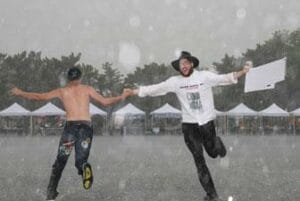By Howard Wilkinson
For many of the elderly who live in the Russian-Jewish immigrant enclave of Roselawn, coming to America meant trading one set of fears for another.
Many of the about 300 immigrants have learned in recent months that walking city streets – something they had done all their lives at home – can be something to fear here. There have been numerous crimes committed against them – muggings, purse-snatchings, assaults – sometimes in broad daylight. Monday night, an elderly couple were threatened at gunpoint and beaten in front of their apartment building.
But for some, the fear of the police is as great as the fear of crime because of their memories of their homeland.
Under the iron hand of Soviet communism, the uniform of a police officer was something to fear, the immigrants say. The knock on the door in the middle of the night stood for repression, for silencing critics, for smothering freedom.
“Many of the crimes that have been committed here are not reported, because these people learned to fear the police,” said Luda Kagan, a Russian immigrant who is program coordinator at the FREE Russian Center on Reading Road. It’s a home away from home for the Russian-Jewish.
The FREE Russian Center – “FREE” stands for Friends of Refugees of Eastern Europe – has been working with the Cincinnati Police Department to educate the immigrants, most of whom have lived here for less than a decade, on how to avoid being victims of crime and making it clear that police are there to help.
“Because of where they come from and because of their age, a lot of them spent most of their lives trying to avoid the police,” said District 4 Police Sgt. Julie Shearer.
Sgt. Shearer said there is no evidence to suggest the elderly immigrants in Roselawn have become the victims of crime because of their ethnicity or religion. They are, Sgt. Shearer said, “simply vulnerable.”
Police officers have been showing up at the FREE Russian Center in recent weeks to talk to residents and give them general safety instructions printed in Russian. The instructions include advice such as avoiding the streets at night, walking in pairs, learning to pronounce street names and, above all, to tell the police when a crime occurs.
Rabbi Mendy Kalmanson, director of the center, organized a campaign that so far has collected about 150 unused cell phones that have been reprogrammed to dial one number only – 911. Most of the donations have come from Cincinnati’s Jewish community.
Rabbi Kalmanson said about 75 people were on a waiting list for a cell phone and said the center needs more donations. Friday morning, he stood at his office door as about a dozen of the immigrants crowded around to receive a cell phone.
“This is a good thing,” Bronya Hernyak told a visitor in Russian, as Ms. Kagan interpreted. “This will make me feel safe. If I am attacked or if I have some kind of medical emergency, I know now I can call for help.”
Rabbi Kalmanson said he believes the work done by police – particularly neighborhood officer Charlie Dukes – has begun to ease the fear among the immigrants.
“I think they know now that police are friendly people,” the rabbi said.
The elderly Russian-Jewish people have been targets of crime, he said, “because they do walk everywhere they go. Most of them have no cars. They don’t necessarily walk to go to the store; they just walk to see friends and neighbors. They have done it all their lives.”
Most of the immigrants, Rabbi Kalmanson said, followed children and grandchildren to the United States, and most know little or no English. In Cincinnati, they are almost all concentrated in private apartment complexes off Section and Reading roads in Roselawn, a neighborhood that has historically had a large Jewish population.
For many of them, the FREE Russian Center is a refuge where they can be with their friends, speak their native tongue, share a meal and stay active.
“It is not just the protection for the body, but protection for the heart and soul,” immigrant Sofia Volkova said.
There, the immigrants can sit in the library and read Russian newspapers, magazines and books – from Russian classics to Jewish history and literature.
Every weekday, they can get a free hot lunch from the center’s kitchen and, every week, a ride to the grocery store. Friday morning in the center’s dining room, dozens of women gathered around the tables to the clatter of Mah Jong tiles. In the back room, about a dozen men – all of them over age 80 or older – laughed and teased each other as they tried to outdo each other on the pool table.
Eighty-year-old Lazar Duletz was there to enjoy the baked chicken lunch and get a cell phone. He came to this country 10 years ago.
It took a while, he said, to adjust to the idea that the police were here to help citizens, not harm them.
“In my country, you stayed away from them at all costs,” he said. “Here, I have them to protect me. This is good.”




